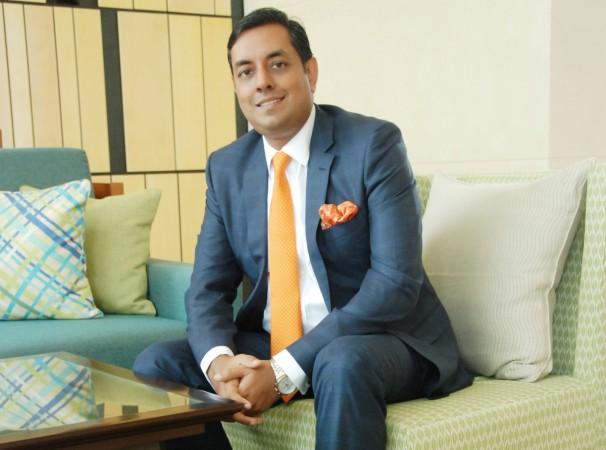
Gaurav Singh, general manager of the Courtyard by Marriott and Fairfield by Marriott on Bengaluru's Outer Ring Road, was recently honored with the "The General Manager Of The Year-2016" title at the Hotelier India Awards.
Singh has been a part of the hospitality industry since 1999 and has worked with leading brands such as ITC Hotels; Oberoi Hotels and Resorts; Leela Hotels, Palaces and Resorts; and Marriott International.
After winning the honor in December 2016, Singh had a quick chat with International Business Times India and spoke about demonetisation, the Centre's decision on waiving service charge, and what the year 2017 holds for the hospitality industry.
Here are excerpts from the interview:
International Business Times: You just grabbed the 'General Manager Of The Year-2016' at the Hotelier India Awards. How does that feel?
Gaurav Singh: The Hotelier awards is a prestigious recognition considering that one is shortlisted by a panel of almost 20 industry leaders across brands – the who's who of our industry. The process also includes being interviewed by panelists for the final award, which is even more grueling.
Though it is recognition from the industry, the selection and shortlisting process makes this even more coveted. The hotel and I have had a wonderful 2016 and this win only makes our efforts and my team's support even more worthwhile, I am grateful.
IBT: After working with well-known names in the industry, you have been with the Marriott brand for about three-and-a-half years. What keeps you going?
Singh: Each of my previous assignments has helped me gain skills, knowledge and exposure. All the previous hotels that I worked for gave me learning in specific areas that has made me stronger. Marriott International is known for its culture – we put our people first, I relate to this naturally.
The journey so far has been exciting with opportunities to work across India, imbibe different local cultures, growing as an individual.
Marriott is also known to be the finest employers – having been in the top 10 for great places to work in India for over a decade now. The balance the organization provides from business acumen, to health and wellbeing, to living your passions, to family, to running the core of hotelier-ing. All of this just makes work so much more enjoyable.
IBT: How do you think 2017 will be for the hospitality industry?
Singh: I believe the best lies ahead of us; all indicators are positive – business sentiment is good, the travel and airline sectors seem to be booming, the government is stable and progressive towards easing how we do business; world economics has an eye on India – 2017 could start positively. The hospitality sector has been through its ups and downs and with demand the way it is at the moment – I think, the next few years are very optimistic.
The industry needs to grow its rates, forecast better and cut waste. Indian hospitality is known today to be a leader in guest satisfaction, though keeping a close eye on social media and developments in the field of customer preferences will drive the future.
IBT: The demonetisation announcement was made during peak season for the hospitality industry. What was the effect, in terms of occupancy rates and restaurant business?
Singh: The hotels that I head are business hotels and we did not see any negative impact, even considering the timing of the announcement.
Our occupancy rates and restaurant footfall seems to be growing at a steady pace. If eventually tax benefits, lower interest rates, a stronger economy and more funds from banks will give impetus to the GDP, then we seem to be on the right track.
IBT: The hospitality industry creates a large number of jobs. Did the cash crunch affect employment due to customers' hesitance to spend?
Singh: The hotel industry is in need of qualified and skilled resources. Jobs are growing, more hotels are opening – Marriott in India, post the merger with Starwood, has more than 80 hotels. Talent is in need today. We did not see customers' spending reduce, and if anything, the rate at which new hotels are coming up – more jobs are going to be created.
IBT: Were there any issues in payments to suppliers providing consumable goods, as they mostly carry out cash transactions?
Singh: No, hotels have a robust supply chain and we work closely with our vendors. Initial understanding of how cash will be available did make us work out a few changes. Though most of business is contracted and the terms are clear.
The impact, if any, did not seem to change our module.
IBT: What do you have to say about the government's recent stance on service charge? Do you think waiving it is fair to the hotel industry?
Marriott in India does not levy a service charge in our hotels. In my personal capacity I believe this charge should be at the discretion of the customer, which is gratuity, or better understood as a tip left after an experience.
IBT: Have new rental trends like Airbnb and OYO rooms had any impact on the hospitality business?
Singh: I think innovation and change is here to stay. More and more is going to happen faster than it ever did. The growth and its impact are based on the stability of the module, the safety nets towards regulation and consistency.
Today a traveller largely looks for clean, hygienic, safe and consistently comfortable experiences. Hotels have a strong culture of standards: All products are well defined and consistent, hotels spend a lot on safety today as that's a key deterrent and even further on training and quality. If these new trends can become more consistent and safe they will have an impact, but it is a different model altogether.















